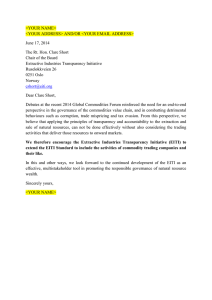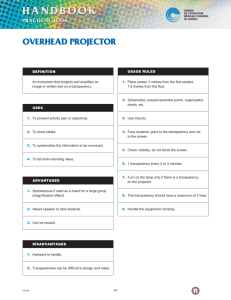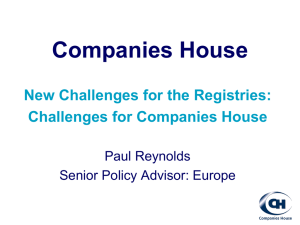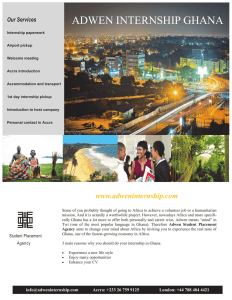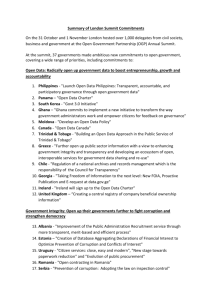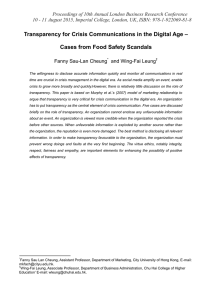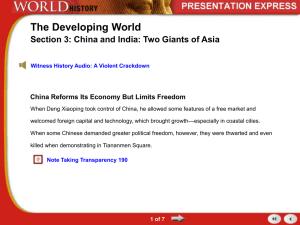African Regional Conference on the Right of Access to Information Matter?
advertisement
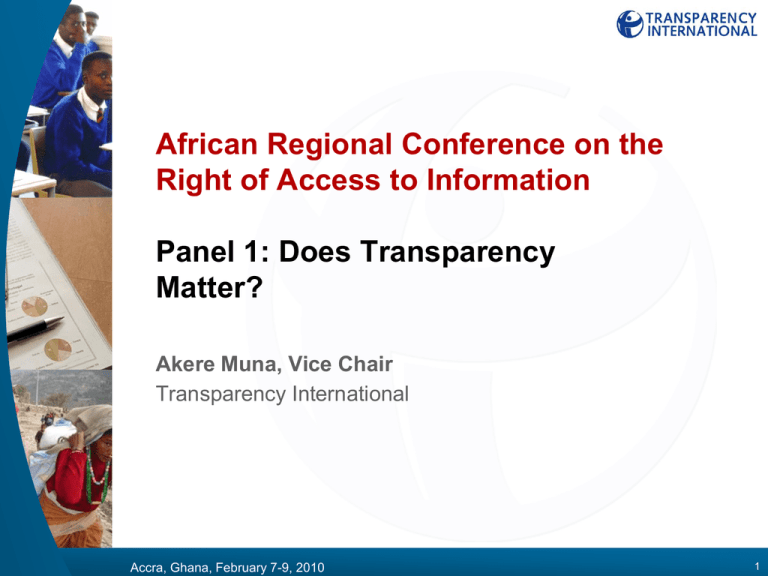
African Regional Conference on the Right of Access to Information Panel 1: Does Transparency Matter? Akere Muna, Vice Chair Transparency International Accra, Ghana, February 7-9, 2010 1 The National Integrity System Model RULE OF LAW INTERNATIONAL ACTORS MEDIA INTEGRITY PUBLIC SERVICE OMBUDSMAN AUDITOR GENERAL NATIONAL QUALITY OF LIFE PRIVATE SECTOR SUSTAINABLE DEVELOPMENT PUBLIC AWARENESS S O C I E T Y’ S V A L U E S 2 PUBLIC SERVICE OMBUDSMAN AUDITOR GENERAL A Crumbling Integrity System PUBLIC AWARENESS S O C I E T Y’ S V A L U E S 3 Transparency does Matter, because… No Transparency means: 1.Lack of information 2.No Accountability 3.Corruption 4.Loss of Resources 5.Poverty Accra, Ghana, February 7-9, 2010 4 TI 2009 Global Corruption Barometer (1) The Barometer asked more than 73,000 individuals around the world the extent to which they perceive 6 key sectors and institutions to be corrupt. TI 2009 Global Corruption Barometer (2) Petty Bribery by Service TI examples TI Zambia “Show me the Money” (2007) report - people do not know about public finances or that they had a right to see the auditor general’s report 1. Opacity allows corruption to flourish TI estimates over the past 20 years African leaders have siphoned off $140bn of illegal assets 2. Resource Curse exacerbated by lack of transparency (see EITI later) The 2008 Promoting Revenue Transparency report on oil and gas industry showed that: • most companies do not disclose their revenues (evaluated 42 companies in 21 countries out of which 5 in Africa) • citizens can only hold governments to account if they have access to information Accra, Ghana, February 7-9, 2010 8 Budget/Expenditure Tracking (1) Public Expenditure Tracking Surveys (PETS) Efforts by Civil Society Organisations Budget tracking is possible only insofar as: 1. budgetary information is available and 2. sub-national institutions grant access to their records Budget/Expenditure Tracking (2) Freedom of information laws and a transparency-ready civil service are necessary for budget tracking to work. Implementing a budget tracking programme is a good occasion to put freedom of information laws at a test and to start bring about a culture of transparency. Recognising this potential, Transparency International has developed programmes like “Africa Education Watch” (AEW). TI Africa Education Watch Programme (AEW) AEW progamme in 7 African countries showed that: • most parents do not know that school fees are illegal • book keeping and sound financial management lack dearly both at school and district level • 85 % of schools surveyed across all countries had either deficient accounting systems or none at all The AEW report (to be launched on 23.02.2010) highlights: • lack of access to information (e.g. to budgets of schools) • lack of citizen oversight and • identifies certain corrupt practices common in primary schools throughout the seven surveyed countries (e.g. abusive collection of school fees, embezzlement of school books and other resources). Accra, Ghana, February 7-9, 2010 11 EXTRACTIVE INDUSTRY TRANSPARENCY INITIATIVE Three and half billion people live in countries rich in oil and gas and minerals. With good governance, exploitation of these resources, can generate revenues to foster economic growth and reduce poverty. However when governance is weak, such resources may result in poverty, corruption and conflict. The Extractive Industry Transparency Initiative seeks to strengthen governance by improving transparency and accountability in the Extractives sector Accra, Ghana, February 7-9, 2010 12 EXTRACTIVE INDUSTRY TRANSPARENCY INITIATIVE A country that has fully and to the satisfaction of the EITI Board met with the four sign up indicators becomes a candidate country. •Issue unequivocal public statement of its intention to implement EITI •Commit to work with CSO and companies on EITI implementation; •Appoint a senior individual to lead EITI implementation efforts; •Publish a work plan (whose cost has been estimated) with measurable targets and an implementation timetable that has been agreed to by key stakeholders. Once country has obtained the Candidate status it has 2 years to be validated as a compliant country. African Candidate countries: Angola, Burkina Faso Cameroon, Central African Republic, Cote D’Ivoire, DRC, Equatorial Guinea, Gabon, Ghana, Madagascar, Mali, Mauritania, Mozambique, Niger, Nigeria, Sierra Leone, Republic of Congo, Sao Tome and Principe, Tanzania, Zambia, Other Candidate countries: Kazakhstan, Kyrgyz Republic, Mongolia, Norway, Peru Timor-Leste, Yemen Total Number of Complaint countries: Liberia, Kazakhstan 13 Transparency does matter, but… Transparency alone is not enough! Accra, Ghana, February 7-9, 2010 14 Strategies for success • Learn from experience • Form coalitions with like-minded groups • Inform citizens about the benefit of transparency • Work at grass-roots level • Involve private-sector: multi-nationals should be held accountable • An existing Access to Information law is good, using it and monitoring it is even better Accra, Ghana, February 7-9, 2010 15 Accountable really to no one, its finances "off the books" -------- provided an unprecedented opportunity for fraud, waste, and corruption involving---------, and many others. In its short life, more than $23 billion would pass through its hands. And that didn't include potentially billions more in ------------ shipments the ---------- neglected to meter. At stake was an ocean of cash that would evaporate whenever the---------- did. All parties understood that there was a sell-by date, and that it was everyone for himself. --------- hospital administrator told The Guardian of England that, when he arrived to sign a contract, ------officer representing the------- had crossed out the original price and doubled it. ………… officer explained that the increase (more than $1 million) was “his retirement package.“ ---------lawyer for whistleblowers who have worked for ----------, says simply that during that---------- first year under the----------- the country was turned into "a free-fraud zone." Accountable really to no one, its finances "off the books" for U.S. government purposes, the Coalition Provisional Authority (C.P.A.) provided an unprecedented opportunity for fraud, waste, and corruption involving American government officials, American contractors, renegade Iraqis, and many others. In its short life more than $23 billion would pass through its hands. And that didn't include potentially billions more in oil shipments the C.P.A. neglected to meter. At stake was an ocean of cash that would evaporate whenever the C.P.A. did. All parties understood that there was a sell-by date, and that it was everyone for himself. An Iraqi hospital administrator told The Guardian of England that, when he arrived to sign a contract, the army officer representing the C.P.A. had crossed out the original price and doubled it. The American officer explained that the increase (more than $1 million) was “his retirement package." Alan Grayson, a Washington, D.C., lawyer for whistle-blowers who have worked for American contractors in Iraq, says simply that during that first year under the C.P.A. the country was turned into "a free-fraud zone." (Billions over Bagdad, Vanity Fair Oct,2007) “We must be the change we wish to see in the World” 20 Thank you for your attention! Akere Muna: amuna@transparenc.org Transparency International Accra, Ghana, February 7-9, 2010 21

